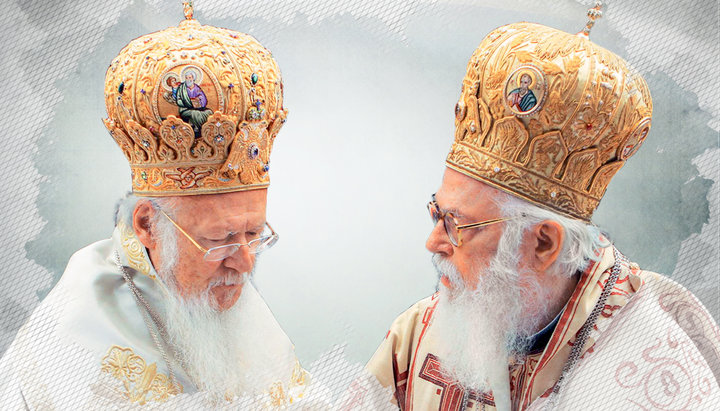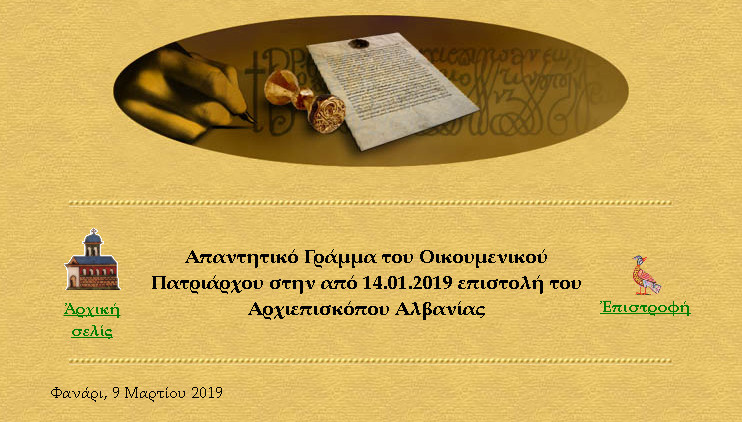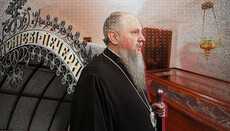What Phanar replied to the Letter of Albanian Church

Primates of the Albanian and Constantinople Churches exchanged views on the “Ukrainian issue”. Let’s now analyze their positions.
On March 9, 2019, on the official website of the Patriarchate of Constantinople, Patriarch Bartholomew published his reply to the Primate of the Albanian Orthodox Church, His Beatitude Archbishop Anastasios, in the aftermath of his letter on the “Ukrainian issue” of January 14, 2019. It’s worth reading both documents to compare the theological argument of the parties and conclude who is right.

It has been almost three months since the OCU emerged, yet no Orthodox Church has recognized it so far, except for Constantinople. Instead of recognition, Primates of the Local Churches keep sending messages to Patriarch Bartholomew in which they either ask for clarification of Phanar’s decisions on Ukraine or reasonably point to the impossibility of recognizing such decisions. The letter of the Primate of the Albanian Church has a very clear logical structure. It contains a description of the well-known facts, then gives their theological assessment and offers a clearly articulated way out of this situation.
But before proceeding to a more detailed analysis of these logical parts of the Letter of Metropolitan Anastasios, let us give a little information on what the Albanian Orthodox Church is.
On the territory of modern Albania, the first Christians began to appear in the III century. In the X century, the first episcopal throne was formed, which was under the jurisdiction of the Ohrid archdiocese. Since 1767, the jurisdiction of the Constantinople Patriarchate began to extend to this Albanian diocese. After Albania became an independent state in 1912, a church movement for autocephaly arose.
Today, Constantinople claims that any independent state has the right to its Local Church. But this is only today, when it comes to Ukraine, while in the past when the dioceses in Bulgaria, Serbia, Albania, and so on, declared their desire to quit the jurisdiction of the Constantinople Patriarchate, it couldn’t agree less to that. Not to mention the fact that one of the main reasons for such a desire was resistance to the policy of appointing ethnic Greeks to episcopal thrones among the Slavic nations, which Phanar had pursued for centuries.
In 1922, the Albanian Church and Laity Council proclaimed autocephaly, which was not recognized by Constantinople. Instead, it granted autonomy to the Albanian Church in 1926. Autocephaly was granted a little later, in 1937. After the Second World War, the Albanian Church suffered a tragic fate. Harassment of the authorities escalated into full-scale persecution, the confession of the Orthodox faith was forbidden under penalty of death. In 1969, Albania was declared by the authorities the first completely atheistic country in the world.
With the fall of the communist regime in the early 1990s, the Albanian Church was revived. And we must pay tribute to the Patriarchate of Constantinople for its help. But this good service of Phanar was accompanied by very indicative moments. Firstly, the status of the Albanian Church was reduced to the position of Exarchate, and secondly, the policy of appointing ethnic Greeks to the thrones was carried on. Thus, the current Primate Archbishop Anastasios (Yannoulatos) was appointed Exarch of the Albanian Church and three Greek bishops were appointed to the Episcopal thrones. Subsequently, in 1998, it was possible to agree on equal representation of Greeks and Albanians in the Holy Synod of the Albanian Church. In 2006, the Council of clergy and laity of the Albanian Church unanimously approved a new Charter, in which the Albanian Church was again recognized as autocephalous. Today, it consists of 6 dioceses, approximately 100 communities. The flock accounts to nearly 700 thousand believers.
The fact that the current Primate of the Albanian Church, Archbishop Anastasios is a Greek, also appointed by the Patriarch of Constantinople, and he was not afraid to protest against the decisions of Phanar in Ukraine, speaks eloquently about how lawless those decisions are.
Now in more detail about the Letter of Archbishop Anastasios to Patriarch Bartholomew. As it has been already mentioned, it provides a factual narrative, offers a theological assessment and a solution.
Citation of facts in the Letter of Archbishop Anastasios
Fact 1. Mr. Denisenko is a man deprived of his episcopal dignity and excommunicated.
Quote from the Letter of Metropolitan Anastasios: “We are talking about the actions of Mr. Filaret Denisenko (the main initiator of the Ukrainian church crisis). The circumstances of his life are widely known. He was ordained bishop of the Moscow Patriarchate in 1962, was chairman of the Department for External Church Relations and Metropolitan of Kiev. In 1991, he began to ask for autocephaly but not from the Ecumenical Patriarchate, but from his then-Mother Church, the Moscow Patriarchate. In 1992, he was deposed, expelled in 1997 and anathematized by the Russian Church – part of the One, Holy Catholic and Apostolic Church – and these actions were recognized by all autocephalous Orthodox Churches.”
Fact 2. In the state of excommunication from the Church, Mr. Denisenko dared to “perform religious rites,” including “ordinations” of “bishops.”
Quote: "All the while that Mr. Filaret was defrocked and anathematized, he was performing non-canonical rites, which were not valid sacraments."
Fact 3. The Church of Christ from time immemorial has not recognized the "sacraments" performed by persons who were excommunicated.
Quote: “As a main pan-Orthodox ecclesiological principle, it is recognized that the ordinations of heretics and schismatics, and especially those deposed and excommunicated, as well as “sacraments”, performed outside the Church, are not valid. This basic principle is inextricably linked with the Orthodox doctrine of the Holy Spirit and forms the unshakable foundation of the apostolic succession of Orthodox bishops. We are convinced that this principle should not be neglected.” The statement is quite categorical, given the fact that Patriarch Bartholomew not only recognized but also "served" with persons who do not have any canonical episcopal rank.
Fact 4. Mr. Epiphany Dumenko was elected head of the OCU by direct instructions of Mr. Denisenko, who despite this election continues to call himself the “patriarch”.
Quote: "Finally, we know that the election at the so-called Unification Council of the new primate of the Church of Ukraine was the result of persistence of Mr. Filaret, who is now – which is particularly notable – referred to in Ukraine as ‘His Holiness the Honorary Patriarch of Kiev and All Rus-Ukraine’."
Fact 5. The actions of Patriarch Bartholomew in Ukraine did not lead to the solution of the problem.
Quote: "The sought reconciliation among Orthodox Ukrainians who suffered persecution from godless authorities in the past has not yet been achieved."
Fact 6. The Ukrainian situation is fundamentally different from how the Serbian, Bulgarian, and other Local Churches received their autocephaly. The difference is that in Ukraine it is the schismatics who ask for autocephaly, but not the canonical Church. Nevertheless, Constantinople completely disregards the position of the UOC, the largest and only canonical Church.
Quotation: “Hundreds of thousands of Orthodox believers under the omophorion of Metropolitan Onufriy (according to statistics, in January 2018 they had 12,069 parishes, 90 bishops, 12,283 clerics, 251 monasteries and 4,412 monks) refused to participate in the process of granting autocephaly; moreover, they broke off the Eucharistic communion with the Ecumenical Patriarchate. In the past, the church plentitude of those countries that were granted autocephaly – Serbia, Romania, Bulgaria, Georgia, Poland, Albania, the Czech Republic and Slovakia – was one.”
Evaluation of facts in the Letter of Archbishop Anastasios
The first point. “Ordinations” performed by the schismatics cannot be considered canonical. Moreover, these actions are nothing more than blasphemy against the Holy Spirit.
Quote: “Inter alia – the consecutive ordinations of his secretary, Sergei Dumenko, now Metropolitan Epiphany to the deacon, the priest, and finally, to the bishop. In your letter of December 24, it says: "We have reinstated them to their episcopal and priestly ranks" However, we ask ourselves the question: to what extent did the ordination, performed by Mr. Filaret, while he was deposed and anathematized, become true in the Holy Spirit and receive the true seal of the apostolic succession ex post facto, without the canonical ordination? <...> We find it difficult to understand how the void and empty becomes spirit-bearing “by oikonomia”, in what way are the actions that constituted blatant blasphemy against the Holy Spirit (like, for example, invoking the Holy Spirit by the then excommunicated and deposed Mr. Filaret) retroactively recognized ‘by oikonomia’?"
The second point. The actions of Patriarch Bartholomew threatened the unity of the Orthodox World.
Quote: “We deeply deplore that our fears, which we repeatedly expressed when we met with representatives of the Ecumenical Patriarchate (July 2018) and during our personal conversation in Crete (October 2018), came true. Instead of reconciliation and unification of the Orthodox Christians of Ukraine, we can see the imminent threat of destroying the unity of all universal Orthodoxy.”
The third point. You should not deceive yourself and reassure yourself and others, that in time everyone will agree to the decisions of Phanar, recognize the OCU and there will be peace and quiet. History shows just the opposite.
Quote: “Assumptions that the current commotion and evident separation will not last long and all Autocephalous Orthodox Churches will eventually approve of what has happened, from the point of view of anyone who knows the history of church splits and the persistence of religious fanaticism, can only be considered unfounded assessments. Some reassuring speculations that this will happen ... in the next century are particularly cynical. Serious wounds that did not receive timely medical care are not treated with time. Usually they only grow even bigger and deeper.”
As it can be seen, Metropolitan Anastasios and the Holy Synod of the Albanian Church, on whose behalf the Letter was sent to Phanar, by no means exaggerate and do not invent non-existent facts. There aren’t any political or ethnic preferences in the letter. Albanian hierarchs do not side with the Russian Orthodox Church. Moreover, they rather harshly criticize the refusal of the ROC to take part in the Cretan Council and the break off in the eucharistic communion with Constantinople.
Quote: “Our criticism of the Russian Church for refusing to participate in the Holy and Great Council of the Orthodox Church in Crete is already known. We also criticized the Russian Church for the hasty decision to break the Eucharistic communion with the Ecumenical Patriarchate. In particular, in our letter to His Beatitude Patriarch Kirill of Moscow, we wrote: ‘Decisions of the hierarchy of the Russian Church cannot deprive Orthodox churches under the jurisdiction of the Ecumenical Patriarchate of the actual work of the Holy Spirit. It is impossible for us to agree with such decisions. The Divine Eucharist, the sacrament being incomprehensible in its holiness and unique in its significance, must remain above whatever church strife.”
What the Albanian Church offers
The only possible way out of this situation may be the Council of Local Orthodox Churches. Quote: “The current situation requires new approaches and inspired ideas to ensure peace in Ukraine and especially to preserve the dangerously affected unity of Orthodoxy. In this regard, we firmly believe that the solution to the problem is to resort to conciliarity in the Holy Spirit, as was clearly stated and emphasized in Crete: ‘The Orthodox Church expresses its unity and catholicity through the Council. Conciliarity penetrates its entire organization, the way of making decisions and determines its path’.”
But having quite rightly mentioned conciliarism as a fundamental principle of Orthodox ecclesiology, the Albanian Church made a very significant mistake in its Letter: recognition of the exclusive rights of Constantinople to convene a Pan-Orthodox or Ecumenical Council. Quote: “So, being filled with the conciliar spirit of the Holy Great Council, the Albanian Orthodox Autocephalous Church sends a fiery appeal to the Ecumenical Patriarchate so that fulfilling its exclusive prerogative to coordinate the Orthodox Churches, it would convene as soon as possible an All-Orthodox Synaxis or Council in order to prevent the imminent threat of wounding schism which can damage the credibility and value of the testimony of Orthodoxy in the modern world." The fact that this is a mistake is probably realized by the Albanian hierarchs themselves. After all, recognition of exclusive rights for Phanar completely subverts the principle of conciliarity. If Phanar is against the council, then no conciliarity is possible? What is the basis of such an “exclusive prerogative” in the Letter of Metropolitan Anastasius is not commented. No canons justifying this are cited. Just because there are no such canons. It can be said that this is just a diplomatic curtsey towards Phanar; still it does not make the statement about its “exclusiveness” correct.
What was the reply of His All-Holiness Bartholomew the First?
The answer boils down to one single argument: we are right because we are No 1.
Quote from Patriarch Bartholomew's Reply: “God-bearing fathers who, through divine and sacred canons, entrusted Constantine’s throne with the well-known omnipotent and terrible super-boundary responsibility not in the form of privileges but sacrifices, guided by the Holy Spirit, when there is a need for a final settlement of issues arising in the local Churches, which cannot be resolved by themselves."
First, there are no canons that would impose “super-boundary responsibility” on Constantinople or other advantages besides primacy of honor. If one follows the letter of the canons scrupulously, then this honor comes after the Bishop of Rome. No authority has ever been given to Phanar to resolve conflicts in other Local Churches.
Secondly, the association of the Constantinople throne with the throne of Constantine deserves special attention. Saint Equal-to-the-Apostles Constantine the Great was a secular ruler, emperor, but not a bishop. If the Phanarians associate themselves with the "throne of Constantine" in a secular sense, then it is proper to ask them a question: where is this "throne of Constantine" now? Didn’t it turn into the throne of a Muslim ruler 500 years ago?
Thirdly, the split in Ukraine is not a problem that the UOC itself cannot solve. This “problem” is solved by repentance and reunification with the Church. For this end, the intervention of the Patriarch of Constantinople is absolutely irrelevant. Or can he offer something else than repentance?
Further in the Answer of Patriarch Bartholomew, a number of historical precedents are traditionally given, which he tries to interpret in support of his claim to the primacy of the Church. One can, of course, engage oneself in their detailed analysis and refutation, yet it is better to pay attention to the fact that without being able to justify their actions on the basis of the Holy Scriptures and the holy canons of the Church, Patriarch Bartholomew resorts to the historical case-study.
Then the Phanar’s head tries to justify his recognition of the schismatic "ordinations". For this end, he refers to the document of 1887 which allegedly proves the validity of such recognition. Quote: "There is, Your Beatitude, one important study, compiled by miracle-performing ever-memorable Metropolitan Angialu and then Basil Smyrna in 1887, and approved in the council on the canonicity of ordinations of clergy performed by a schismatic or deposed bishop, which I’m also sending to you; it verifies a perpetual point view of the Orthodox Church on this issue.”
However, in the very document, at the very beginning, Metropolitan Basil of Smyrna recognizes that on the basis of the sacred canons of the Church, it is impossible to draw a conclusion about the effectiveness of such schismatic “ordinations”. All his reasoning is pinned on an arbitrary analogy of the sacrament of priesthood with the sacrament of baptism. But the fact that even a layman can baptize another person in the case of mortal danger but at the same time cannot perform ordination proves that such an analogy is wrongful. Due to the lack of theological and canonical grounds for his statements, Metropolitan Basil also cites a number of historical events, which he interprets to suit himself.
Patriarch Bartholomew concludes his answer with the words: “We proclaim authoritatively on the Phanar the inherited the doctrine of the Church and we draw from the well of our Holy Fathers, not pursuing personal gain or other low motives and political goals. Consequently, the assimilation of the stated truths depends on all of us, not to reaffirm them, since they have already been truly proven by church practice for a long time, but in order to once again follow the faithful path, hallowed by valuable experience of the Fathers who only had hope in God, Who is Glorious and Powerful forever. Amen".
Firstly, the “authoritative, inherited doctrine of the Church” implies that Christ is the head of the Church, not the Patriarchate of Constantinople.
Secondly, reading the words that Phanar is not pursuing personal gain, one can immediately recall the agreement with Petro Poroshenko dated November 3, 2018, where the President undertook to transfer to Phanar in Ukraine “buildings and premises, other property items” necessary “for the functioning of the mission".
Thirdly, if Phanar really hadn’t been guided by “low motives and political goals,” it wouldn’t have taken these decisions precisely after negotiations with the US State Department officials.
Unfortunately, the Reply of Patriarch Bartholomew to Metropolitan Anastasios shows that Phanarians are sinking deeper in their delusions. They are reluctant to repent of their mistakes and thoughtlessness despite rather diplomatic appeals of the Local Churches. All this means that the heresy of Constantinople papism is being firmly established and is increasingly threatening the Church.











